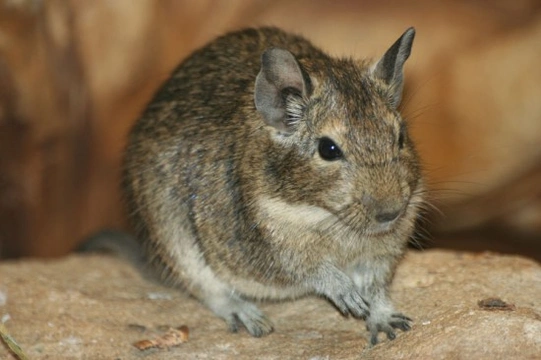
Complete Guide to Caring for Degus: Setup, Diet & Care
The degu is a small caviomorph rodent native to Chile, closely related to the Guinea pig and chinchilla. These inquisitive and sociable animals have grown in popularity as pets in the UK, known for their friendly nature and playful behaviour. Degus generally live six to eight years in captivity, provided they receive good care and attention.
1. Choosing How Many Degus to Keep
Degus are social creatures and thrive in pairs or groups of up to six. Keeping just one can lead to boredom and loneliness, which affects their wellbeing. When acquiring degus, it is ideal to buy a bonded pair or group to avoid the stress of integrating new members later, which can be difficult and cause conflicts.
2. Setting Up Their Equipment and Environment
Step 1: Cage Selection
Degus are prolific chewers, so they need a sturdy tubular metal wire cage with no wooden components they could gnaw through. A cage designed for chinchillas or rats works well due to its size and climbing suitability. The wire should be thick to prevent paw injuries, and the cage should be tall with multiple levels, ramps, and walkways to encourage natural climbing and exploration.
Step 2: Bedding and Nesting
Use soft, dust-free hay such as Timothy hay inside a nesting box for resting and sleeping. For floor bedding, avoid wood shavings which can irritate their skin; paper-based bedding is preferable. Keep the cage away from direct sunlight, cold drafts, damp, or heat sources like radiators to maintain a consistent ambient temperature.
Step 3: Enrichment
Include gnawing blocks, wooden toys, and cuttlebones to help maintain healthy teeth growth. Degus need regular dust baths similar to chinchillas, so provide a dish with chinchilla dust two or three times a week for 20-30 minutes to keep their dense fur clean and healthy. Additionally, treadmill wheels (solid surface, ~25 cm diameter) and tunnels provide safe exercise opportunities.
3. Feeding Your Degus
Step 1: Balanced Diet Basics
Degus are herbivores with a sensitive metabolism prone to diabetes, so they require a low-sugar diet high in roughage. Provide a complete balanced food like degu-specific nuggets or pellets, which supply essential nutrients. Soft hay should be constantly available to satisfy grazing instincts.
Step 2: Treats and Supplements
Offer mineral treats and vitamin supplements recommended for degus to support health. Fresh fruit should be given only sparingly as an occasional treat due to sugar content. Avoid any treats high in sugar or honey which can trigger diabetes.
Step 3: Water Access
Ensure fresh clean water is available at all times via a sturdy water bottle securely fastened to the cage side. Keep feeding bowls heavy and stable to prevent spills.
4. Handling, Socialisation, and Playtime
Step 1: Initial Acclimatisation
When you bring your degus home, allow a few days before handling so they can acclimatise to new surroundings without stress. Avoid rearranging their cage immediately and speak to them softly to help them get used to your presence.
Step 2: Gentle Handling
Approach slowly and scoop them up under their stomach supporting their weight with both hands. Never lift by the tail as it can injure them. Degus might be fidgety and prefer running about rather than sitting still. Over time, they may enjoy relaxing on your lap after play sessions.
Step 3: Safe Playtime
Degus move quickly when out of the cage, so ensure the room is secure and free from hazards such as chewable wires or small escape routes. Consider investing in a playpen or use a runner ball for safe exercise and stimulation outside the cage.
5. Routine Care and Health Maintenance
Degus tend to be hardy but benefit from regular health checks by a vet experienced with exotic pets. Maintain a clean environment by spot-cleaning the cage daily and thoroughly cleaning weekly to prevent illness. Providing a litter box helps concentrate their toileting to one area, easing cleaning stresses.
Keep sugary treats strictly limited to avoid diabetes. Routine nail trims every few months help prevent discomfort. Be alert for signs of illness such as lethargy, reduced appetite or changes in behaviour and seek prompt veterinary advice.
6. Essential Shopping List for Degus
- Sturdy, chew-proof cage with thick wire and multiple levels
- Pet-safe disinfectant suitable for cleaning cages
- Nesting box with soft Timothy hay bedding
- Degu-appropriate litter or paper-based bedding
- Complete degu food pellets or nuggets
- Heavy, stable food bowl and water bottle with brush for cleaning
- Mineral stone and vitamin/probiotic supplements
- Dust bath dish with chinchilla dust
- Gnawing blocks, cuttlebones, wooden toys, ladders, and tunnels
- Safe treats with low sugar content
Providing this complete setup along with responsible diet and regular veterinary care ensures your degus enjoy a happy, active, and healthy life. Remember, degus need social companionship, mental and physical stimulation, and a carefully monitored diet to thrive as domestic pets.



